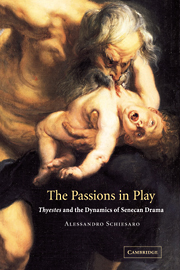1 - Poetry, passions and knowledge
Published online by Cambridge University Press: 22 September 2009
Summary
iterque populis Ditis ad superos datur
(Seneca, Oedipus 573)negat enim sine furore Democritus
quemquam poetam magnum esse
posse, quod idem dicit Plato
(Cicero, De divinatione 1.80)At the core of Seneca's Oedipus stands Creon's stunning narrative of his search for a truth that has so far escaped his fellow-citizens, even that cunning antonomastic observer, the king of Thebes. Overcoming a deep reluctance to speak, on account of Oedipus' threats, Creon retells his experience in all its gory detail (509–658). Suitably enough, the setting for his account is grim and terrifying, remote and obscure: ‘there is, far from the city, a wood dark with ilex-trees near the well-watered vale of Dirce's fount’ (est procul ab urbe lucus ilicibus niger | Dircaea circa vallis inriguae loca, 530–1). It is in this extraordinary location, whose wilderness is the usual environment for magical contacts with the divine, that the sacerdos (548), soon referred to as a vates (552), begins his portentous rites. The prophet, who is possessed by divine powers, intones a magic song: ‘he unfolds a magic song, and, with frenzied lips, he chants a charm which appeases or stirs the evanescent ghosts’ (561–3: carmenque magicum volvit et rabido minax | decantat ore quidquid aut placat leves | aut cogit umbras), then ‘sings again, and looking at the ground, summons the shades with a deeper, stunned voice’ (567–8: canitque rursus ac terram intuens | graviore manes voce et attonita citat).
- Type
- Chapter
- Information
- The Passions in PlayThyestes and the Dynamics of Senecan Drama, pp. 8 - 25Publisher: Cambridge University PressPrint publication year: 2003



